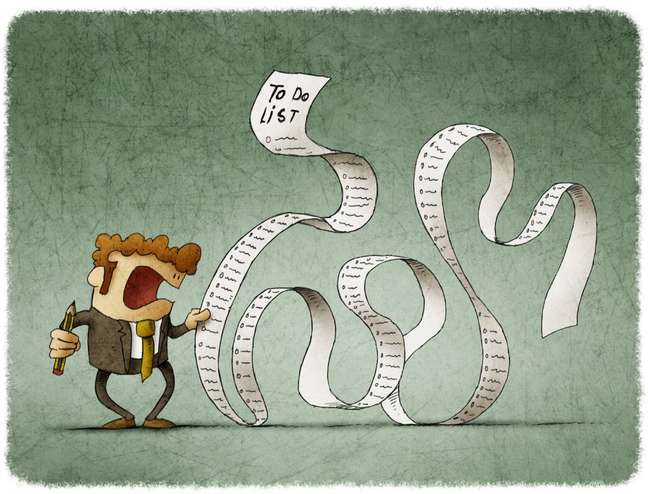Why can a person who eats well, exercises and sleeps well enough still feel mentally and emotionally exhausted? The expert explains the daily customs that can sabotage our energy.

Are you so exhausted that it’s hard to even find words to describe this feeling, even if you’ve already made sure you don’t have any health problems?
Maybe you’ve already followed the classic advice: eat a balanced diet, exercise and get enough sleep.
However, there are some daily habits that could affect your stamina and you may not even suspect it.
Among these silent energy saboteurs are old acquaintances, such as sitting in the wrong position or postponing meals.
There are also things we do without realizing it, such as breathing incorrectly when we have many things in mind, as psychologist Uma Naidoo pointed out. Huffington Postor having too many tabs open on the computer, as neurologist Rana Mafee explained in detail for the same publication
There are also some elements that can be considered unexpected among these saboteurs. To explore them, we spoke with psychiatrist Leela R. Magavi, regional medical director at Community Psychiatry and MindPath Care Centers in California, United States.

1. TV series, movies and news
Watching movies or series is something we do to relax, so we asked Magavi why experts like her include these activities in the list of possible factors that cause mental fatigue.

“As humans, we are emotional creatures and many of us are empathic and capture the feelings of characters in TV shows and movies,” he explains.
“They can remind us of painful experiences in our life, any kind of disability, weakness, loss or insecurity, and all of this can cause many associated emotions such as sadness, anxiety, fear, anger, which can affect us even if they are in our subconscious.”, adds.
“So when you watch a lot of these TV shows, even if you don’t feel like you are thinking about them openly, those feelings will be just under the surface. As you work, while you are with your family, this huge amount of emotion can take a toll. Take care. of you and makes you feel drained all day without you noticing, “he says.
Magavi says that something similar can happen after seeing or reading the news, “because they make you think about what’s going on in the world”.
However, he makes it clear that this does not mean that watching television or reading newspapers is bad.
the antidote

“What I recommend to combat this fatigue is, after reading or watching something, to process it, either through a diary or an expressive writing (writing down your thoughts and feelings to understand them more clearly), or by talking to a friend or family member. “
“It allows emotions to come out, so you don’t internalize them and consume your energy.”
But you don’t always have a lot of time to take care of yourself … Is there a simpler method?
“It’s nice to have a mental ‘check-up’ with yourself: what emotion did this article or TV show make me? It can be very quick and easy to do”.
“For example, if you just watched The Lion King and you feel sad because the father died, it can make you worry about the death of the people you love. But by doing a mental “check-up”, you can remind yourself that everyone around you is doing everything possible to stay healthy. “
“Something this short can help you not internalize those emotions and not get bombarded by them.”
the exception

Reading stories in physical books, however, can have the opposite effect than on screens.
“Not only do you not have the blue light of the screen, which causes eye strain and headaches, but when you read you have to use your imagination, so many people find that reading, while very emotional, is very therapeutic and reassuring.”
2. Sports
Sport can be considered something that amuses, takes away from the routine, but it can also be in some ways a harmful element for energy.
“Fanatics can become too absorbed in the sport and accept wins and losses as their own, feeling overly sad, demoralized or euphoric.”
“Any extreme emotion is often exhausting: intense happiness can deplete many of the brain circuits; deep sadness can be related to anxiety, which overloads the brain and makes you feel very tired.”

the antidote
“The important thing is to be aware of what you are feeling”, says the specialist.
“If you are very emotional, ask yourself: do I have to take a break, a snack, a quick shower … what should I do to calm down right now?”
“Take a deep breath, stretch and walk a little,” he advises.
3. The plans
Planning is a way to control reality, to organize life, to contain chaos.
But then again, something we would instinctively put in the package of things that cause relief might just be causing stress.
In this case, the claim that (almost) everything in excess is bad applies again.
Planning is very useful, up to a point.
Being constantly exposed to a busy schedule can cause increased anxiety and negatively affect memory and information processing speed.

“Some people spend so many hours organizing schedules and lists that they are unable to live and enjoy life consciously. They are always worried because they are late on this, they are not up to date on that and they really don’t feel self-compassion and gratitude for themselves. for the things they do. things they managed to accomplish that day. “
“This can cause a lot of feelings of sadness, demoralization or fatigue.”
“In some people, it ends up in their dreams.”
“I have adult patients who dream that they will be late for school, that they haven’t finished their homework … the next morning.”
the antidote
“I always recommend that you spend five to ten minutes just thinking about what your main goals for the day are, and at the end of the day, even if they haven’t been met, don’t spend too much time thinking about them. important, “says Magavi.
The psychiatrist also recommends not making plans too early, “because life is always changing and it is important to be flexible”.
“When people plan for the long term, they simply anticipate that everything in their unknown world will work like a clockwork mechanism to reach that goal in time.”
“But if something changes in their family, their friends, their job and they can’t reach that goal, they feel completely overwhelmed.”
One trick is to plan the obligatory – meetings, appointments, family celebrations – and leave the rest of the time as free as possible.
– Text originally published in https://www.bbc.com/portuguese/geral-62144907
Source: Terra
Benjamin Smith is a fashion journalist and author at Gossipify, known for his coverage of the latest fashion trends and industry insights. He writes about clothing, shoes, accessories, and runway shows, providing in-depth analysis and unique perspectives. He’s respected for his ability to spot emerging designers and trends, and for providing practical fashion advice to readers.







